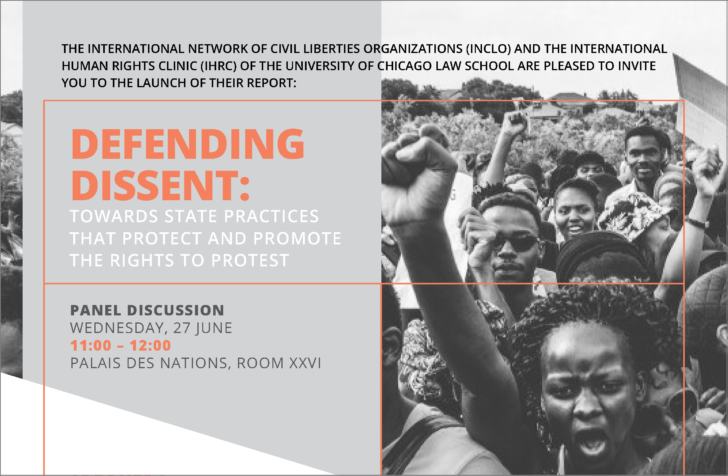At a panel discussion on the sidelines of the UN Human Rights Council session in Geneva, INCLO and the IHRC presented the main findings of their new publication Defending Dissent: Towards State Practices that Protect and Promote the Rights to Protest.
The report aims to bridge the divide between principles and practice, offering concrete examples and analysis of existing laws, institutional mechanisms and processes, and deployment tactics that work to promote – or in some cases undermine – protests and public assemblies. It is the result of extensive research, interviews with 26 policing experts in 8 countries, and the expertise from INCLO members engaged in advocacy on human rights and policing.
The publication highlights case studies of policing approaches gathered from countries around the world. The report and its recommendations are organized around three themes: preventive measures and institutional design, tactics and the use of force, and accountability and oversight. Within these themes, the report identifies 12 core principles and 33 good practices essential for their realization.
Protest and public gatherings are fundamental tools for people to express their grievances and seek political, social and economic reform. However, state policing institutions often treat them as national threats, resorting to arbitrary, excessive and discriminatory force.
“The repression of protest and violations of human rights in the context of demonstrations spans countries in the north and south,” Marcela Perelman, one of the main authors of the report from INCLO member organization CELS, said at the panel discussion. “In Argentina, there is currently a regressive scenario in terms of protection of protest, with setbacks in protocols and forms of police intervention in social conflicts and protests that have already resulted in two deaths.”
“This report provides an important tool for the work of national human rights organizations,” she added.
Defending Dissent offers authorities a toolkit to evaluate their existing policies, practices and institutional mechanisms. It addresses how international standards and principles on the management of assemblies can be operationalized by the state and its policing and security institutions to protect and promote the rights to protest.
“Freedom of expression and assembly are the bedrock of democracy, and there are international legal standards that safeguard these rights. However, there is an absence of research and direction from a human rights perspective that provides practical guidance for the implementation and application by the state and its policing institutions of these international standards. This report aims to fill that void,” said Rob De Luca from Canadian Civil Liberties Association (CCLA), another of the report’s main authors.
An executive summary of the report is available here.

